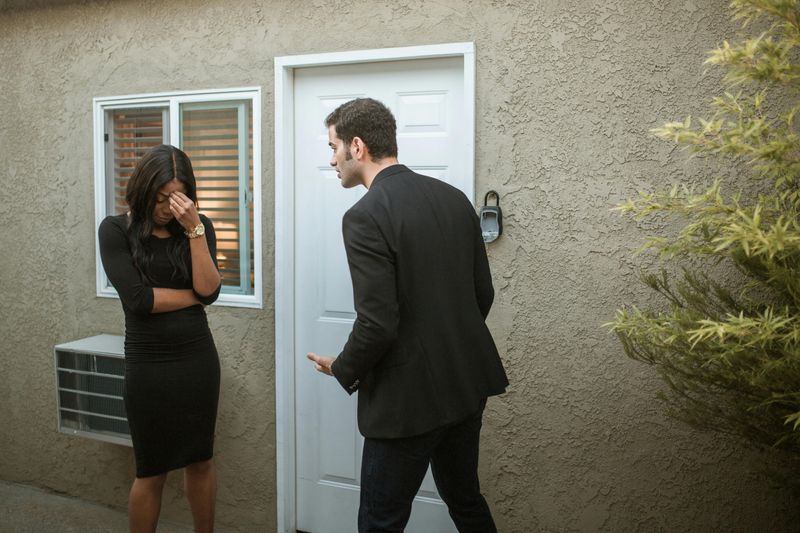12 Signs You’re Dating a Narcissistic Man Without Realizing It

Ever felt like something’s off in your relationship but couldn’t quite put your finger on it? Narcissistic behavior can be tricky to spot, especially when you’re emotionally involved. These men are masters of manipulation, often leaving their partners confused, drained, and questioning their own reality. Understanding these warning signs might just save you from years of emotional damage.
1. Affection as Leverage

Affection arrives in waves, but only when he feels his grip on you loosening. Yesterday he was cold and distant. Today, after you mentioned needing space, he’s suddenly showering you with compliments and gifts.
This emotional rollercoaster isn’t love—it’s manipulation. Real love maintains consistency through ups and downs. His affection isn’t about your happiness but about maintaining control.
Notice how quickly warmth disappears once you’re securely back in his orbit. This calculated affection serves as emotional handcuffs, making it harder to recognize the unhealthy patterns keeping you trapped.
2. Blame Always Falls on You

A narcissistic partner transforms into an Olympic-level blame gymnast when confronted with his mistakes—suddenly, everything is your fault, no matter how absurd.
Watch how seamlessly responsibility shifts to you, his boss, traffic, or even the weather—anywhere but himself. Genuine apologies are as rare as desert rainfall, and when they do come, they’re usually paired with justifications or followed by sulking that makes you comfort him.
This pattern erodes your confidence while building his protective shield against any personal growth. Eventually, you might stop bringing up issues altogether to avoid the exhausting blame game.
3. Insults Disguised as Jokes

Mocking you or your looks—especially in front of others—always gets brushed off as “just a joke.” Your cheeks burn with embarrassment while he laughs, positioning you as overly sensitive for not appreciating his “humor.”
These aren’t innocent jokes—they’re calculated jabs wrapped in plausible deniability. The pattern becomes clear: public settings make perfect stages for these performances, ensuring you can’t respond without seeming dramatic.
Friends might laugh awkwardly, unaware they’re witnessing emotional abuse. Over time, these “jokes” chip away at your self-esteem while boosting his sense of superiority. Remember: someone who loves you builds you up, not tears you down for entertainment.
4. Your Reactions Become Your Fault

He promised to call last night but didn’t. When you express disappointment, suddenly you’re “overreacting” and “being crazy.” His behavior vanishes from the conversation while your response becomes the problem.
This clever tactic—gaslighting—makes you doubt your perception and appropriate emotional responses. Soon you’re apologizing for feeling hurt rather than addressing what hurt you.
The genius of this manipulation lies in how it trains you to question yourself instead of his actions. You begin walking on eggshells, measuring every reaction against his unpredictable standards. This psychological maze leaves you disoriented, making it harder to trust your instincts when they’re screaming that something isn’t right.
5. Emotions Become Your Weakness

Expressing real concerns gets dismissed with dramatic sighs and accusations of being “too emotional,” silencing your feelings and minimizing your voice. Your feelings—whether disappointment, hurt, or anger—are consistently labeled as overreactions rather than valid responses.
This dismissal serves a strategic purpose. By framing your emotions as irrational, he avoids addressing the behaviors that triggered them. The underlying message becomes clear: your feelings are inconvenient obstacles to his comfort.
This emotional invalidation creates a dangerous imbalance where his perspective always trumps yours. Eventually, you might start suppressing your feelings altogether, creating an internal pressure cooker while he enjoys the peaceful silence of your self-censorship.
6. Conversations Have One Star: Him

Your exciting work promotion gets a quick “that’s nice” before he launches into a 45-minute monologue about his day. His stories deserve rapt attention, while yours receive glances at his phone.
This conversational imbalance reveals how he truly values the relationship—as a spotlight for himself. You’ve become an audience member rather than an equal participant. Notice how quickly he interrupts when you’re speaking, yet expects unbroken attention during his narratives.
Healthy relationships feature mutual curiosity and shared airtime. When someone consistently dominates conversations and shows minimal interest in your experiences, they’re revealing their core belief that their life matters more than yours.
7. The Transformation When You Try Leaving

After weeks of neglect, he suddenly shows up with flowers the moment you mention needing space—affection timed as a tactic, not genuine care. This dramatic personality shift isn’t coincidental.
The moment you reach your breaking point, he transforms into the man you always hoped he’d be. Attentive texts replace silence. Grand gestures replace indifference. The whiplash is disorienting—and deliberate.
This calculated charm offensive isn’t genuine change but crisis management. Once you’re securely recommitted, watch how quickly old patterns return. This cycle keeps you trapped in an exhausting loop of hope and disappointment, always believing the real him is the version that appears when you’re walking away.
8. Different Relationship Rules Apply To Each Of You

Midnight texts from “just a friend” are excused away, even as he polices your own friendships with suspicion and control. Yet when a male colleague calls you about a project, accusations of inappropriate behavior quickly follow.
This double standard reveals the fundamental inequality he believes should exist in your relationship. His freedom remains non-negotiable while yours faces constant scrutiny and restriction. The underlying message becomes clear: his social connections represent freedom, while yours represent potential disloyalty.
Pay attention to how he justifies this imbalance—often through projection, suggesting you’re the one who can’t be trusted. This controlling behavior isn’t about love or protection but about establishing dominance and isolating you from support networks.
9. You Feel Constantly Off-Balance

Remember when you felt confident and sure of yourself? That person seems increasingly distant as you navigate this relationship maze. The constant criticism and shifting goalposts have left you second-guessing even your simplest decisions.
Confusion becomes your default state—wondering if you’re actually overreacting or if your feelings are valid. The exhaustion isn’t just physical but bone-deep emotional fatigue from trying to anticipate his reactions and manage his emotions.
Most troubling is how you’ve begun blaming yourself for these feelings. This self-doubt isn’t accidental but the predictable outcome of sustained psychological manipulation. Your disorientation is evidence of the relationship’s toxicity, not your inadequacy.
10. Fear Mingles With False Hope

Something shifts in your stomach when he enters the room—not butterflies, but dread. You’ve started measuring your words carefully, knowing certain topics trigger his anger or cold withdrawal.
Despite this walking-on-eggshells existence, you cling to moments of connection and charm that appear just frequently enough to keep hope alive. “He can be so wonderful when he wants to be,” you tell yourself, focusing on potential rather than painful reality.
This contradiction—fear alongside desperate hope—creates a powerful psychological bond. The intermittent reinforcement of affection after periods of neglect or cruelty becomes almost addictive, keeping you invested in a relationship that’s slowly diminishing your spirit.
11. The Future He Promises Never Arrives

Big promises about trips or the future appear mid-argument, serving as shiny distractions that never materialize. These magnificent promises—about travel, marriage, or life changes—appear strategically when the relationship feels shaky.
Future-faking serves as emotional superglue, binding you to potential rather than addressing present problems. Notice how these grand plans lack concrete details or follow-through. They exist primarily as conversational escape hatches.
When you eventually mention that promised vacation or commitment, he’ll seem surprised by your “obsession” with it or claim circumstances have changed. This pattern keeps you perpetually forward-focused, tolerating current unhappiness for a tomorrow that continuously recedes like the horizon.
12. Your Boundaries Become Mere Suggestions

Clear requests for space are brushed aside, with your boundaries ignored or twisted to suit his needs. He responds by showing up unannounced with friends, acting surprised when you seem upset. Your clearly stated boundaries might as well be written in invisible ink.
This persistent boundary violation extends beyond physical space to emotional and sexual boundaries too. Your “no” becomes the starting point for negotiation rather than a complete sentence deserving respect.
Each time your limits are ignored without consequence, they weaken further. Eventually, stating boundaries feels pointless, creating the perfect environment for escalating control. Remember: someone who repeatedly disregards your clearly expressed limits isn’t misunderstanding—they’re choosing to prioritize their desires over your autonomy.

Comments
Loading…